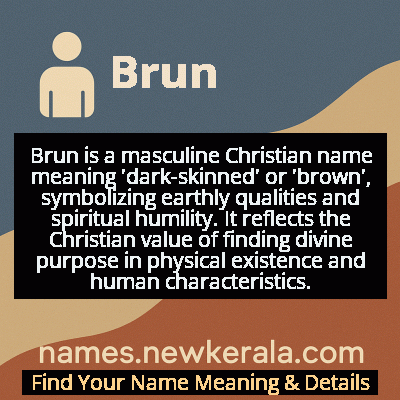Brun Name Meaning & Details
Origin, Popularity, Numerology Analysis & Name Meaning of Brun
Discover the origin, meaning, and cultural significance of the name BRUN. Delve into its historical roots and explore the lasting impact it has had on communities and traditions.
Name
Brun
Gender
Male
Origin
Christian
Lucky Number
1
Meaning of the Name - Brun
Brun is a masculine Christian name meaning 'dark-skinned' or 'brown', symbolizing earthly qualities and spiritual humility. It reflects the Christian value of finding divine purpose in physical existence and human characteristics.
Brun - Complete Numerology Analysis
Your Numerology Number
Based on Pythagorean Numerology System
Ruling Planet
Sun
Positive Nature
Leaders, ambitious, highly driven, self-reliant, innovative.
Negative Traits
Overly aggressive, domineering, impatient, selfish.
Lucky Colours
Red, orange, gold.
Lucky Days
Sunday.
Lucky Stones
Ruby, garnet.
Harmony Numbers
2, 3, 9.
Best Suited Professions
Entrepreneurs, managers, engineers.
What People Like About You
Courage, determination, leadership.
Famous People Named Brun
Brun of Cologne
Religious Leader
Archbishop of Cologne who played a key role in the Ottonian Renaissance and imperial politics
Brun of Querfurt
Missionary
Canonized saint known as the 'Apostle of the Prussians' for his missionary work in Eastern Europe
Brun the Great
Duke
Duke of Saxony and military leader under Emperor Otto I, known for expanding Christian territories
Brun of Würzburg
Bishop
Influential bishop and imperial chancellor who founded several religious institutions
Name Variations & International Equivalents
Click on blue names to explore their detailed meanings. Gray names with will be available soon.
Cultural & Historical Significance
Historically, the name gained prominence through Saint Brun of Querfurt (c. 974-1009), a missionary bishop martyred while evangelizing in Eastern Europe, and Saint Bruno of Cologne, founder of the Carthusian Order. These figures established Brun as a name associated with religious dedication, missionary zeal, and intellectual pursuit. During the Ottonian period, multiple Brunos served as archbishops and imperial advisors, cementing the name's association with ecclesiastical authority and political influence within the Holy Roman Empire.
The name's cultural significance extends beyond religious contexts to represent Germanic heritage and medieval European history. It appears in numerous historical records, chronicles, and literary works, often associated with nobility, learning, and reform movements. The various Saint Bruns helped establish educational and monastic traditions that shaped European civilization, making the name a symbol of cultural preservation and religious renewal during turbulent historical periods.
Extended Personality Analysis
Individuals named Brun are typically perceived as grounded, reliable, and possessing strong moral convictions. They often exhibit a practical approach to life, combining earthy sensibility with deep intellectual or spiritual pursuits. The historical association with religious leaders suggests traits of leadership, determination, and the ability to inspire others through both word and action. There's often a sense of quiet strength and resilience that characterizes those bearing this name.
Psychologically, Bruns tend to be contemplative and methodical in their decision-making, preferring substance over superficiality. The name's connection to 'darkness' or 'earthiness' doesn't imply negativity but rather depth, mystery, and connection to fundamental truths. They often display loyalty in relationships and commitment to their principles, sometimes appearing reserved but possessing intense dedication to their chosen path. The combination of practical wisdom and spiritual depth makes them natural counselors and trusted advisors.
In social contexts, Bruns often project an aura of stability and reliability that others find comforting. They may not be the most flamboyant personalities in a room, but their consistent character and depth of understanding earn them respect and trust. Their approach to challenges tends to be systematic and principled, reflecting the name's association with both earthly pragmatism and higher purpose. This balance between the practical and spiritual realms makes them particularly effective in roles requiring both hands-on capability and visionary thinking.
Modern Usage & Popularity
In contemporary times, Brun remains a relatively uncommon but respected given name, primarily found in German-speaking regions and among families with strong Christian traditions. While its popularity peaked during the medieval period, it has experienced minor revivals among parents seeking traditional, meaningful names with historical depth. The name maintains a classic, somewhat aristocratic feel and is often chosen by families valuing religious heritage and European cultural roots. Modern usage tends to favor the fuller 'Bruno' variation, with 'Brun' serving as either a formal given name or affectionate nickname. Current naming trends show it appearing more frequently in countries like Germany, Austria, and Switzerland, particularly among families with Catholic backgrounds who appreciate its saintly associations and timeless quality.
Symbolic & Spiritual Meanings
Symbolically, Brun represents the integration of earthly existence with spiritual aspiration. The 'dark' or 'brown' quality symbolizes humility, grounding, and connection to the natural world—qualities highly valued in Christian ascetic traditions. It represents the idea that spiritual enlightenment comes through engagement with, rather than rejection of, the physical realm. The name also carries connotations of stability, reliability, and enduring strength, much like the earth itself. In metaphorical terms, Brun suggests the rich, fertile soil from which wisdom and faith can grow, combining practical wisdom with deep spiritual insight. This symbolic meaning reflects the Christian concept of incarnation—the divine manifest in the material world—making the name particularly significant in theological contexts where the sacred and mundane intersect.

